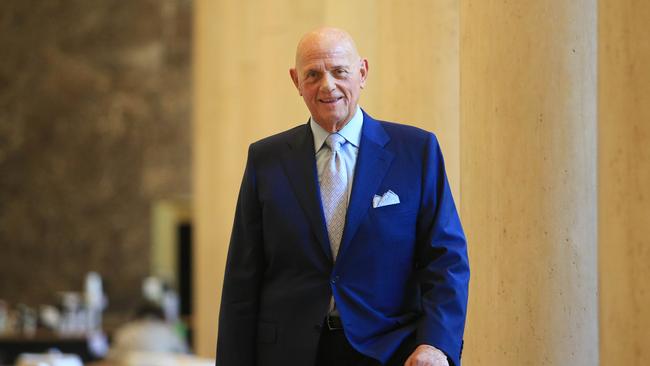Myer boss John King confident reborn department store can withstand economic shocks
Myer boss John King is confident his continued transformation of the once ailing department store won’t be derailed by interest rate hikes and stretched household budgets.
Myer boss John King is confident his continued transformation of the once ailing department store won’t be derailed by the twin spectres of interest rate hikes and stretched household budgets, as he impresses investors with Myer’s best interim profit since 2014 and a thumping lift to its dividend payout.
It sent Myer shares racing almost 19 per cent higher on Thursday. The result pushed its biggest shareholder – retail billionaire Solomon Lew’s Premier Investments – solidly into paper profits on its 25.79 per cent stake, which Mr Lew began accumulating in 2017.
Mr King met Mr Lew on Thursday to discuss the latest financial results, sweetened by the prospect that ASX-listed Premier will take home the largest slice of a swollen Myer interim dividend, pocketing a cheque of around $16.9m in May.
Now brimming with confidence and flush with cash – the first time the retailer has remained in a net cash position for the entire half since it listed on the ASX in 2009 – Myer declared a more than doubling of its interim dividend to 4c per share and matched that with another 4c per share special dividend. The combined 8c per share interim and special dividend will be paid on May 11 and compares to a dividend of only 1.5c for the same period last year.
Myer on Thursday posted a 24.2 per cent lift in sales to $1.884bn for the 26 weeks to January 28 as net profit rose 101.4 per cent to $65m.
The profit was at the top end of guidance, its strongest interim profit in nine years and its best sales result on record. Net cash for the period was up $50m to $267m.
The result set off a wave of buying activity in the market. Shares in Myer – the former ugly duckling of the retail sector – rallied 19 per cent to a six-year high of $1.135 before closing up 17.5c, or 18.32 per cent, at $1.13.
The rally was helped by a trading update provided at the half-year results which showed sales momentum through Christmas had continued into the new year, with sales over January and February up 16.1 per cent.

Mr King, the former CEO of British department store chain House of Fraser who was drafted to run the sickly Myer in 2018, pointed to the return of in-store traffic to his CBD stores, a revival of tourism and the growing power of his loyalty program for handing him a doubling of the half-year profit, which could be partly redirected to long-suffering Myer shareholders.
He believes he has now built a retailer that is less exposed to the vagaries and volatility of seasonal fashion, with growth more evenly spread across other categories such as fragrances, cosmetics, childrenswear and homewares, making Myer more resilient – no matter what the economy throws at it.
“We are cautious about the pressures that the consumer will come under, particularly those going on to new fixed mortgage rates, but we are confident that we have enough in the pipeline that will help mitigate any kind of economic downturn.
“We think that if we continue to give people reasons to come and shop with us they will come and shop with us,” Mr King told The Australian on Thursday.
The department store owner has entered a new growth phase after suffering from years of sliding profitability. In 2018 it swung to a loss of almost $500m amid fears of a collapse.
Mr King said the higher dividend payout reflected the confidence the company had in its operations, even when the economic outlook was clouded by rising interest rates and fears consumers would stop spending.
“We are very pleased with the strength and quality of our first-half results, with a best-on-record first-half sales performance, significantly improved profitability and a balance sheet that continues to provide a strong foundation for future growth,” he said.

Myer said its CBD stores were the strongest channel, increasing 53.7 per cent, or 20 per cent on a comparable basis when lockdown periods were excluded.
Group online sales declined 9.8 per cent to $382.3m as customers migrated back to physical stores. Mr King highlighted that Myer now was a much more broadly based retailer and the December-half results showed it was not dangerously dependent on seasonal fashion as it had been in the past.
“It all did OK actually. There isn’t one category. Fragrance and cosmetics come into its own around the Christmas peak period, and certainly Black Friday as well, but it was pretty much across (categories). And we are not relying on one particular category any more. We’ve got quite an even spread across all those categories. So men’s, women’s, kids, home and beauty.
“So from that perspective, we’re pretty pleased with the results overall.”
Mr King said the record sales were also driven by its popular Myer One loyalty program, which now is associated with three quarters of its sales, along with new brands and experiences.
“The savvy customer realises that loyalty programs are another revenue stream, another currency stream. So those points are real reasons to go and shop. But also, we’ve refurbished stores, we have redone a lot of stores. So what we’re able to do is give people what they want, whether it’s digital or whether it’s physical.
“We have given them reasons to go and shop with us.”






To join the conversation, please log in. Don't have an account? Register
Join the conversation, you are commenting as Logout